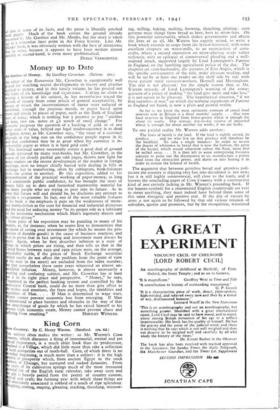Money up to Date Outline of Money. By Geoffrey Crowther.
(Nelson. los.)
editor of the Economist Mr. Crowther is exceptionally well 'aced for watching recent developments in theory and practice pplied to money, and in this timely volume he has poured out he fruits of his knowledge and experience. Making no claim to riting a history of his subject, he has nevertheless traced the owth of money from some article of general acceptability, by ans of which the inconveniences of barter were reduced or bolished, through the precious metals, to paper based upon em and finally to pieces of paper, such as the Bank of England one of today, which is nothing but a promise to pay "another note, two Jos. notes or LI worth of small change." For omestic purposes the question of a backing of gold, or of any her store of value, behind our legal tender-currency is as dead a, Queen Anne; as Mr. Crowther says, " the value of a currency spends in the long run on the confidence people repose in it; and that confidence may be as great when the currency is in- ,nvertible paper as when it is hard gold coin."
This historical survey necessarily covers a good deal of ground :ready traversed by many text-books, but Mr. Crowther, in the curse of his closely packed 400 odd pages, throws new light for any readers on the recent development of the market in foreign xchange, now no longer chiefly busied with dealing in bills of schange but in transferring, often by cablegram, bank-balances rom one centre to another. By this exposition, added to his emonstration of the practical working of paper-money, as long it commands public confidence, he has brought the story of oney fully up to date and furnished trustworthy material for
e many people who are trying to peer into its future. As to 'hat that future will and should be, he disclaims any attempt to rovide a programme. In fact, one of the most valuable features f his book is the emphasis it puts on the weaknesses of mone- ry manipulation as the cure for financial and industrial distresses d the need for reducing money "to its proper role as a lubricant r the economic mechanism which Man's ingenuity directs and is labour drives."
Some parts of his exposition may be puzzling to many of his aders, as, for instance, when he seems first to demonstrate that excess of saving over investment (by which he means the pro- union of durable goods) is the cause of business reaction; and n to prove that in fact saving and investment must always be .ual. Again, when he first describes inflation as a state of mgs in which prices are rising, and then tells us that in the nited States between 1922 and 1929 prices were, on the average, markably stable, if the prices of Stock Exchange securities filch surely do not affect the problem from the point of view the man in the street) are excluded from the index number; t that nevertheless these same years witnessed an almost un- raileled inflation. Money, however, is almost necessarily a zzling and confusing subject, and Mr. Crowther has at least
. t its right place and perspective. " Money," he says, organised in the perfect banking system and controlled by the iscient Central bank, could do no more than give effect to
e wishes and emotions, the fears and hopes, the timidities and Males of Man. . . . If Man is determined to wage wars, oney cannot prevent economic loss from emerging. If Man determined to place barriers and obstacles in the way of that e interchange of goods by which he has raised himself to his esent high economic estate, Money cannot prevent chaos and


























 Previous page
Previous page